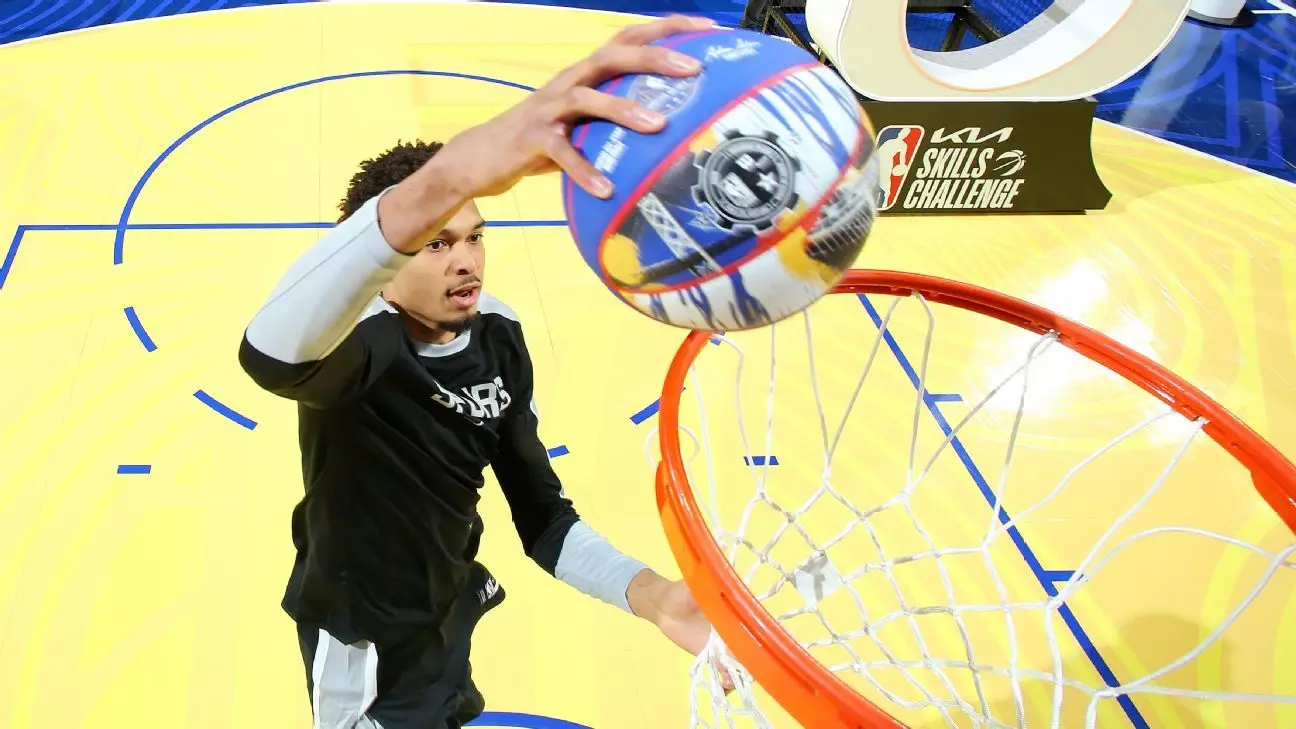The Kia Skills Challenge has become a staple of NBA All-Star Weekend, showcasing the multifaceted skills of some of the league’s best players. This year, the competition culminated in an exciting final between Team Cavs and Team Warriors, with Team Cavs emerging victorious. However, the event didn’t finish without its share of controversy, particularly surrounding Team Spurs and their unconventional approach to the obstacle course. This incident raises important questions about the interpretation of the rules and the spirit of competition in such high-stakes events.
Team Cavs, led by Donovan Mitchell and Evan Mobley, managed to clinch victory with a brisk time of 1:00.03. They outpaced Team Warriors, featuring Draymond Green and Moses Moody, in a closely contested final. The excitement of the challenge was palpable, with players exhibiting an array of skills, including dribbling, passing, and shooting. However, the competition took a turn when Team Spurs, made up of Chris Paul and Victor Wembanyama, faced disqualification in the initial round.
The obstacle course is designed to test players on several fronts, creating a dynamic environment where success requires a blend of agility, accuracy, and strategy. Team Spurs not only failed to fit the mold of traditional competition but attempted to exploit what they perceived as a loophole, focusing their efforts on passes while neglecting essential shooting attempts.
Team Spurs’ strategy was simple: prioritize efficiency over accuracy. By attempting only one shot—a dramatic dunk by Wembanyama—they aimed to finish the passing portion quickly and optimize their time. However, the officials did not see this as a legitimate tactic. The disqualification came after they failed to complete three valid shooting attempts after executing their passes within a competitive time of 47.9 seconds.
Despite Paul’s protestation that their strategy was viable and despite Wembanyama’s inquiries with various league officials about the legality of their approach, the rules were clearly outlined. The Skills Challenge mandates players make one or three valid shooting attempts, and neglecting this fundamental aspect led to their downfall. This scenario left a sour taste among fans and players alike, igniting discussions about fairness, rule interpretation, and strategic creativity.
The aftermath of Team Spurs’ disqualification saw varied reactions. Draymond Green, who is no stranger to navigating the nuances of NBA rules, expressed both empathy and disappointment at the Spurs’ approach. His acknowledgment of Wembanyama’s questioning reflects the significant gray areas in competitive sports where strategy often intersects with regulatory frameworks.
Chris Paul’s history in the Skills Challenge adds another layer to the situation. He has participated in the event six times—all without a victory, raising questions about his strategies over the years. This ongoing trend of disappointment may influence how he approaches future competitions, potentially leading to more conventional methods of participation.
As the league anticipates future iterations of the Skills Challenge, a crucial discourse emerges surrounding what it means to compete. Is the objective merely to finish the course as quickly as possible, even at the expense of adhering to traditional expectations? Or should the ethos of the competition emphasize skill execution in all required facets, even if that means sacrificing speed?
Ultimately, the dynamic between creativity and compliance with rules is at the heart of competitive sports. It shapes how players prepare, the strategies they employ, and how fans perceive their performances. The fallout from Team Spurs’ short-lived strategy will likely prompt the NBA to revisit its rules, safeguarding against loopholes while preserving the exciting nature of the Skills Challenge.
This year’s Kia Skills Challenge will be remembered not only for Team Cavs’ victory but also for the conversation surrounding fair play and innovation in strategy. As players like Wembanyama push the envelope, the clear takeaway is that all participants must remain vigilant of the rules governing the game while exploring unique avenues for achieving success. The Skills Challenge should be a celebration of basketball talent, versatility, and, ultimately, the integrity of the sport.


Leave a Reply